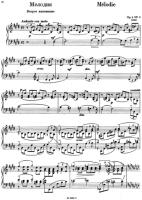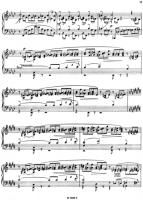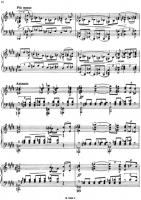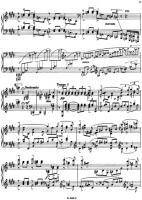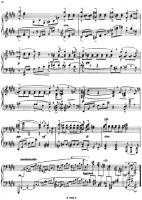Rachmaninoff Sheet Music
 Sergei Vasilievich Rachmaninoff (1 April 1873 - 28 March 1943) was a Russian composer, pianist, and conductor. He was one of the finest pianists of his day and, as a composer, the last great representative of Russian late Romanticism in classical music. Early influences of Tchaikovsky, Rimsky-Korsakov and other Russian composers gave way to a thoroughly personal idiom which included a pronounced lyricism, expressive breadth, structural ingenuity and a tonal palette of rich, distinctive orchestral colors.
Sergei Vasilievich Rachmaninoff (1 April 1873 - 28 March 1943) was a Russian composer, pianist, and conductor. He was one of the finest pianists of his day and, as a composer, the last great representative of Russian late Romanticism in classical music. Early influences of Tchaikovsky, Rimsky-Korsakov and other Russian composers gave way to a thoroughly personal idiom which included a pronounced lyricism, expressive breadth, structural ingenuity and a tonal palette of rich, distinctive orchestral colors.Understandably, the piano figures prominently in Rachmaninoff's compositional output, either as a solo instrument or as part of an ensemble. He made it a point, however, to use his own skills as a performer to explore fully the expressive possibilities of the instrument. Even in his earliest works, he revealed a sure grasp of idiomatic piano writing and a striking gift for melody. In some of his early orchestral pieces he showed the first signs of a talent for tone painting, which he would perfect in The Isle of the Dead, and he began to show a similar penchant for vocal writing in two early sets of songs, Opp. 4 and 8. Rachmaninoff's masterpiece, however, is his choral symphony The Bells, in which all of his talents are fused and unified.
Rachmaninoff sometimes felt threatened by the success of modernists such as Scriabin and Prokofiev and wondered whether to cease composing even before he left Russia. His musical philosophy was rooted in the Russian spiritual tradition, where the role of the artist was to create beauty and to speak the truth from the depths of his heart. In his last major interview, in 1941, he admitted his music, like Russian music, was a product of his temperament. He said, on another occasion, "The new kind of music seems to create not from the heart but from the head. Its composers think rather than feel. They have not the capacity to make their works exalt—they meditate, protest, analyze, reason, calculate and brood, but they do not exalt."
Rachmaninoff - 13 preludes, op 32 Piano Sheet Music
Advertisement
Advertisement
Please click on the button to get the sheet music
You can share this sheet on your Twitter or Facebook account to let your friends know too!
Comments about 13 preludes, op 32 by Rachmaninoff
There are no comments yet
Name (required)
Email (required, will not be published)
Email (required, will not be published)
Total 0/1000 chars
Other music sheets of Rachmaninoff
Search for Free Sheet Music
You can make a search through the entire collection of sheets.
You can make a search through the entire collection of sheets.
Latest Artists
25 klezmer tunes
× 1
Guns N' Roses × 1
Frédéric Laumont × 1
Sense & Sensibility × 1
Celine Dion × 5
G.P. Palestrina × 2
Howard Shore × 2
Blink 182 × 1
Felix Blumenfeld × 1
Richard Rodgers × 1
Thelonious Monk × 1
Harvey Loomis × 1
Ragnarok Online × 1
Peter Cincotti × 1
Ilse de Lange × 1
Walter Donaldson × 1
Mae × 1
Gian Carlo Menotti × 1
Genesis × 1
Luigi Cherubini × 1
Cole Porter × 2
Charles Koechlin × 1
Grieg × 1
Reynaldo Hahn × 1
Jason Mraz × 1
Danielle Messia × 1
Sinead O'Connor × 1
Astor Piazolla × 1
The Police × 1
Enrique Iglesias × 1
The Academy Is × 1
Huub de Lange × 2
Evanescence × 7
billy cobham × 1
Saverio Mercadante × 1
Ben E. King × 2
Aaron Yan × 1
Jazz Holiday Classic × 1
Katy Perry × 1
Angela Espindola × 1
Regina Spekor × 1
Michael Kamen × 1
Giovanni Battista Pergolesi × 1
Cecile Chaminade × 1
Harold Arlen × 1
Riccardo Drigo × 1
Ray Hibbeler × 1
Leopold Mozart × 1
Bill Frisell × 1
Sia Furler × 1
Guns N' Roses × 1
Frédéric Laumont × 1
Sense & Sensibility × 1
Celine Dion × 5
G.P. Palestrina × 2
Howard Shore × 2
Blink 182 × 1
Felix Blumenfeld × 1
Richard Rodgers × 1
Thelonious Monk × 1
Harvey Loomis × 1
Ragnarok Online × 1
Peter Cincotti × 1
Ilse de Lange × 1
Walter Donaldson × 1
Mae × 1
Gian Carlo Menotti × 1
Genesis × 1
Luigi Cherubini × 1
Cole Porter × 2
Charles Koechlin × 1
Grieg × 1
Reynaldo Hahn × 1
Jason Mraz × 1
Danielle Messia × 1
Sinead O'Connor × 1
Astor Piazolla × 1
The Police × 1
Enrique Iglesias × 1
The Academy Is × 1
Huub de Lange × 2
Evanescence × 7
billy cobham × 1
Saverio Mercadante × 1
Ben E. King × 2
Aaron Yan × 1
Jazz Holiday Classic × 1
Katy Perry × 1
Angela Espindola × 1
Regina Spekor × 1
Michael Kamen × 1
Giovanni Battista Pergolesi × 1
Cecile Chaminade × 1
Harold Arlen × 1
Riccardo Drigo × 1
Ray Hibbeler × 1
Leopold Mozart × 1
Bill Frisell × 1
Sia Furler × 1




































